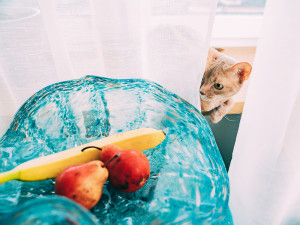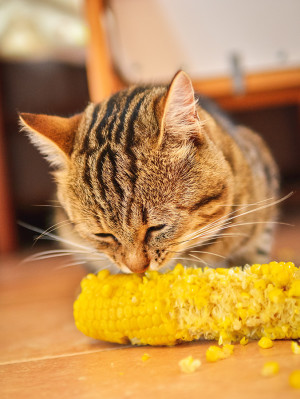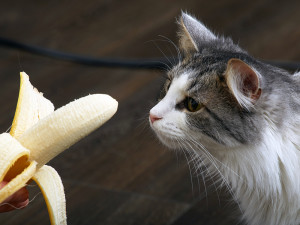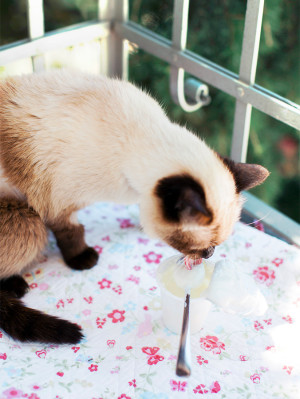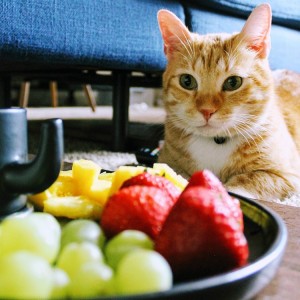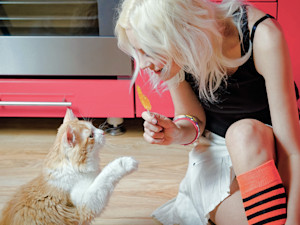Onions are a culinary staple, central to recipes around the world for their deep flavors and health benefits. Unfortunately, they are also toxic to cats.
While a raw onion is unlikely to hold much appeal to your cat, it’s important to know that even cooked dishes and items flavored with onion powder pose a risk to cats, and these kinds of foods cannot be shared. Read on to learn more about the risks of onions for cats.
Nutrition facts: Onions for cats
Onions are the bulb of the Allium cepa plant. They grow underground until they are harvested and can then be prepared raw or cooked for a variety of dishes. As members of the Allium family, they are closely related to other edible plants, including garlic, shallots, leeks, and chives. All plants in the Allium family are considered toxic to cats.
When it comes to human nutrition, onions have many health benefits including being rich in fiber, vitamins, minerals, and antioxidants. While cats cannot take advantage of these benefits from onions, there are many other safe and healthy ways for them to get these nutrients instead.
How much do you spend on your pet per year?
Are onions good for cats?
Onions are not good for cats and are in fact toxic. This is because onions, like all plants of the Allium family, contain compounds that can make cats and some other animals, including dogs, sick.
In onions, this compound is n-propyl disulphide. At low doses, these toxins can cause digestive upset including vomiting, diarrhea, or loss of appetite. At higher doses, this compound damages red blood cells, causing a condition known as hemolytic anemia. When a cat has hemolytic anemia, their red blood cells lyse, or burst open, releasing their contents and they cannot deliver oxygen to tissues throughout the body. This can cause serious illness and even death in severe cases.
It takes about five grams of onion per kilogramopens in new tab of body weight to cause toxicity in cats. The effects can also be cumulative, meaning that even if a cat ingests smaller amounts of onions over multiple days, the level of toxicity can build up and cause problems. For this reason, it is best to completely avoid sharing any and all foods containing onion with your cat.
Can cats eat food cooked with onion powder?
Onions prepared in any manner still remain toxic, even if they are cooked, dehydrated, or dried. The toxins are not neutralized by cooking, and they may be even more concentrated in dehydrated products like onion powder, onion flakes, and other spice preparations.
This means that it may take a smaller amount of these products to cause the same toxic effects as a larger volume of raw onion. It is a good reminder to carefully read the labels and check the ingredients in any foods you plan to share with your cat. It may be surprising to see how often onion seasoning is used in the foods we eat and these foods need to be off-limits to all kitty friends.
Are onions completely safe for cats?
Onions are not completely safe for cats; in fact, they make the list of some of the most toxic foods for cats. Whenever possible, it is best to keep any foods containing onion away from your cat. If you accidentally feed your cat something containing onions, or they sneak away with a chunk of food that was not intended for them, be sure to contact your vet or a pet poison hotline right away to determine if they need emergency treatment. Sometimes, signs of onion toxicity can take a few days to develop, so even if your cat is acting fine at first, it is important to be as proactive as possible.
Some of the common signs of onion toxicity include:
Digestive upset: The toxins in onions irritate the digestive tract and may cause signs including loss of appetite, nausea, vomiting, or diarrhea.
Pale gums: Cats with anemia, or low red blood cell counts, often have pale or white gums instead of bubble-gum pink gums. This is due to a lack of red blood cells in circulation. Some cats have naturally black-pigmented gums so this sign may be difficult to observe.
Lethargy: Anemia also causes cats to feel weak and tired. This is due to the lack of red blood cells, which are critical in transporting oxygen to all the tissues of the body. Cats who are weak and tired may have trouble standing, walking, or jumping, and they may avoid activities like playing or even going to their litter box.
Yellow-tinted skin or eyes: When red blood cells burst open as a result of hemolytic anemia, they release pigments, including bilirubin, which have a yellowish tint. When this pigment is present in the blood, it can cause the skin to have a yellow or orange hue, which may be most visible in places with less fur, like the inside of the ears or belly, as well as on the white part of the eye.
Difficulty breathing: The lack of red blood cells due to anemia often causes animals to breathe quickly or with difficulty. This is because their bodies try to compensate for the lack of oxygen in the tissues by breathing rapidly. Any cat that is showing signs of rapid breathing, panting, or difficulty breathing should be seen by a vet right away.
Dark-brown urine: Cats with hemolytic anemia may have very dark urine due to abnormal pigments in their blood which are then excreted in the urine. This includes the yellow pigment, bilirubin, as well as others, like methemoglobin.
The bottom line: Can cats eat human food?
Cats can eat many human foods, and it can be fun to share the occasional snack with your best kitty. Onions provide a good reminder that not every food is safe to share with your cat, however, and it is very important to do your research before sharing any new foods with your cat.
If you are not sure whether or not a food is safe for your cat to eat, be sure to check with your vet or a pet poison hotline first. And while there are many safe options out there that you can share with your cat, make sure you also keep your cat’s specific nutritional needs in mind. Unlike us, cats are obligate carnivores which means they need to get the bulk of their diet from animal-based sources. They do not process certain nutrients, like carbohydrates and sugars, as well as omnivores like us. This means that not all non-toxic human foods are necessarily good for them to eat.
The best way to give your cat a healthy diet is to focus on feeding them a complete and balanced high quality cat food diet that makes up 90 percent of their caloric intake. The remaining 10 percent of their diet can come from healthy treats and table foods. This ensures that your cat gets all of the nutrients they need to avoid any deficiencies and maintain a healthy weight, while carving out space for those fun and rewarding snack sessions.
Other foods that are safe for cats
Plain, cooked tuna and other fish can be safe as long as you follow some basic guidelines.
Yogurt can also be OK in moderation just avoid brands with added sugar.
Peanut butter may be shared in small amounts, too — just watch out for brands high in sodium or added sugars.
Other foods that are dangerous for cats
Popsicles are a good example of foods that are non-toxic but still unhealthy for cats.
Lemons and all citrus should also be avoided for multiple reasons.
Chocolate is toxic to cats and cannot be shared either.
FAQs (People also ask):
How much onion can a cat eat?
None. Onions are toxic to cats and can cause illness even in small amounts.
Is it OK to give cats onions?
No, onions are toxic to cats and can cause serious illness.
Why do cats like onions?
Cats usually do not like raw onions as they have a highly sensitive sense of smell and the pungent odor of onions turns them off.
Can cats eat foods cooked with onions?
No. Cooked onions are as toxic as raw onions for cats.
Are onions good for cats?
No. Onions are not good for cats and can cause serious illness.
Can cats eat any part of the onion plant?
No. The onion plant and all plants in the Allium family are toxic to cats.


